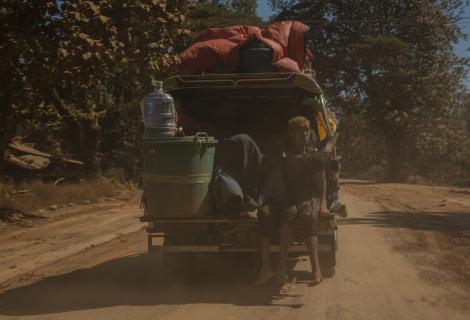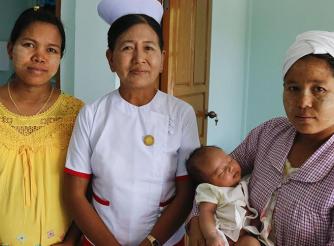How Covid-19 can be an opportunity for Myanmar governance actors and civil society to move towards a mature democracy

Dirgha Raj Sigdel
Introduction
By the 30th January 2020, World Health Organisation (WHO) declared coronavirus (Covid-19) a “global emergency” after its rate of infection and fatality rose exponentially since first identified in Wuhan, China on December 2019. On 7th March 2020, the WHO appealed to world leaders for the implementation of a robust containment protocols to be put in place to slow down the spread. Following suit, several countries have progressively sealed their borders, connectivity by air, land and sea has ceased and a lockdown has been imposed. Country by country, the world has come to a halt. Recently UN chief dubbed coronavirus pandemic as 'worst crisis' since WWII. In all fairness, while this is the right thing to do to contain the virus, to buy more time until the mass vaccine is ready, it is equally important to analyse the human rights dimension and the implication of such covid-19 response measures on hard earned civic space.
Global Gaze
The right to health provides that health facilities, goods, and services should be available in sufficient quantity, good quality, accessible and affordable to all and acceptable without discrimination. Furthermore, the United Nations Committee on Economic, Social and Cultural Rights has stated that the right to health is closely related to, and dependent upon, the realization of other human rights. These include the right to food, housing, work, education, human dignity, life, non-discrimination, equality, the prohibition against torture, privacy, access to information, and the freedoms of association, assembly and movement. As such governments have an obligation to maintain these rights while putting in place the COVID-19 response.
In a number of countries, including China and Iran, governments have failed to uphold the right to freedom of expression by discouraging dissemination of information about the virus, taking actions against journalists and healthcare workers. These attempts are in violation to the Universal Declaration on Human Rights (UDHR), International human rights law, International Covenant on Economic, Social and Cultural Rights and set precedent in the global stage admits the worst crisis of the millennium.
Emergency and Civic Rights
Myanmar identified its first case of Covid-19 on March 23. Since then, 41 cases of infection and four fatality has been reported. Given its existing health care system and level of preparedness, there is no doubt that Myanmar is extremely vulnerable to the highly contagious Covid-19 pandemic. Following the declaration of COVID-19 as a pandemic by the WHO on the 11th March 2020, both the President of Myanmar and the Ministry of Health and Sports (MoHS) stepped-up measures to prevent the spread of COVID-19 in the country. Public gatherings, including the annual Thingyan Buddhist New Year celebrations, have been banned. In addition to the several travel restrictions and blockading the land borders, the government also ordered mandatory quarantines for travelers entering the country. Schools, colleges, and universities have also been closed.
In the midst of this response, a political trend continues on curtailing civic space. By order from the Government of Union of Myanmar (GoUM), all INGOs have been instructed to stop meetings. Myanmar journalists who quoted a rebel spokesman face arrest and their websites were blocked. The peace process has stalled as the government responds to COVID-19, as well internal disagreements and the continuation of military operations in Rakhine and Northern Shan.
There might be more restrictions in place in the days to come as the State Counsellor Daw Aung San Suu Kyi said that Myanmar will be locked down only if needed to slow the spread of COVID-19. Myanmar history shows us that a state of emergency can easily erode the civic rights and liberties recovered through the last ten years. There is a risk that it could persist and endure and might be hard to scaled back when Myanmar returns to normal. One of the country’s leading political magazines has raised concerns saying that “combatting the coronavirus by shutting down the country … would cede greater power to Myanmar’s armed forces.” All of which is happening six months prior to the second democratic national elections that will take place in November 2020.
Greater freedom to Civil Society
Civil society in Myanmar are among key actors for social and political transformation and promotes peace, democracy and development. Civil society as an autonomous arena of un-coerced, voluntary collective actions around shared interests, purposes and values has contested, complemented, corrected and cooperated with governance authorities.
On March 28th, 2020, civil society actors in Myanmar issued a joint statement with extensive list raising concerns about how the Myanmar authorities handle their programme to prevent the spread of the coronavirus or COVID-19. They expressed concerns that the unchecked power during the time of emergency and its utilisation sometime eroded the human dignity and democratic values. Furthermore, they cautioned that any solution with no regard to values on human rights, human dignity, democracy and justice will not only amplify the current suffering but seriously hamper the future recovery efforts. In short, using crisis as a pretext to infringe civic rights will have far reaching and amplified implication.
Thanks to technology and social media, netizens in Myanmar can access available information and exchange opinion (related to virus and emergency) in real time. Any attempt to cease that platform and freedom would erode the trust in authority. In contrast, evidence shows that the opposite: ensuring freedom of expression, transparency and cooperation allow for emergency responses to become stronger and more effective. One way of doing this is for the governance authorities to work closely with civil society and media when responding to threats posed by Covid-19. For that, civil society of Myanmar also expressed solidarity in holding the values of rights, dignity democracy and justice to overcome Covid-19 disaster.
Conflict and Pandemic
Myanmar is marred with multitude of prolonged conflicts, often characterized by the ethno-nationalist sentiments, movements and resistance. While primarily the parties to conflict can be characterized in three - GoUM, Tadmadaw (the military), and ethnic armed organizations (EAOs), the composition, nature, operations, and dynamics are far from simplistic. A lockdown by GoUM and EAOs in their respective and mixed controlled areas might hold the interpretation of assault to other’s freedom, since the conflict itself has stemmed from quest to freedom and autonomy. Neither the existing health services of GoUM and EAOs in silo has the capacity to cope with the scale and scope of the public health crisis. The discriminatory practices embedded in the ethno-nationalism if manifested and prevails, will further divide the communities, groups, and systems and deepen the crisis. Uncheck and arbitrary restriction in conflict zone in Myanmar will have cascading implication ranging from human rights violation, and illicit trade to name few.
ActionAid believes that the emergency response for COVID-19 gives the opportunity for these three key actors to put differences at bay, rallying under the emergency needs of people, and working under the spirit of National Ceasefire Agreement (art. 25 Interim Arrangement). By doing so, Myanmar people will see a unified and coherent response to the pandemic and also a way forward to the stalled peace process. This is an opportunity to move forward in transforming the longstanding unresolved conflicts that have marred the country. This coherent emergency response would also mean to address the needs of those most vulnerable: the people living under conflict zones, internally displaced persons, refuges, people with disabilities, women, children and youth.
Sources
See story from the New York Times: https://www.nytimes.com/2020/04/03/world/asia/myanmar-journalists-arrest-arakan.html.
The Diplomat (26 March 2020) reported that military operations in Rakhine state and Northern Shan state are still on track. With the declaration of Arakan Army as a terrorist organization on March 23, the Tatmadaw kept up the momentum of its operations in Rakhine state. See: https://thediplomat.com/2020/03/amid-coronavirus-pandemic-myanmars-armed-forces-soldier-on/
Myanmar Times 31 Mar 2020 https://www.mmtimes.com/news/state-counsellor-says-lockdown-will-be-used-only-if-needed.html
Frontier Myanmar April 02, 2020 https://frontiermyanmar.net/en/a-tatmadaw-enforced-lockdown-is-no-answer-to-covid-19?fbclid=IwAR3Wl5vLQQ_xiQ_D-TkBXy8kCEjBJW1xj23ivbr-whmBt9sZPMvoY3sSrzw
Mizzama, March 28, 2020 http://mizzima.com/article/myanmar-csos-issue-statement-concern-over-rights-during-covid-19-crisis
The Conversation, May 2, 2018 http://theconversation.com/10-years-after-cyclone-nargis-still-holds-lessons-for-myanmar-95039
The Guardian, July 16 2013 https://www.theguardian.com/global-development-professionals-network/20…
